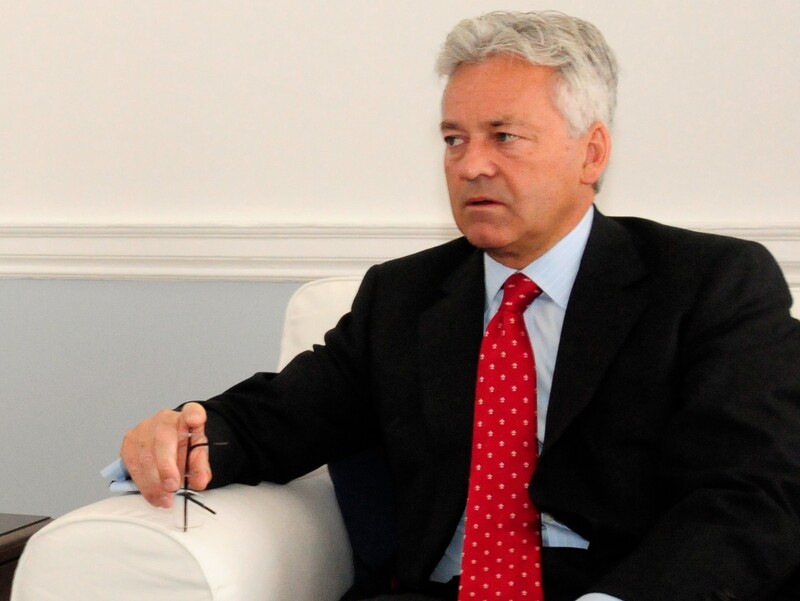Lobby Watch 22 April 2021

UK home affairs minister Priti Patel is said to be “compromised” by Israel lobby ties. (Simon Dawson / No 10)
Alan Duncan was part of Theresa May’s Conservative government in Britain and served as deputy to then foreign minister Boris Johnson.
But unlike many in the current UK government, he is not a supporter of Conservative Friends of Israel, an influential lobby group.
Indeed, in his new book In The Thick of It, he accuses the group of “disgusting interference in our public life.”
Duncan reveals that the group used its influence on the most senior levels of government to block him becoming Middle East minister.
In another section of the book – the diaries of his time in the Foreign Office – he excoriates Priti Patel, currently the British home secretary, as “compromised,” “deceitful,” “morally corrupt,” “contemptible” and “quite despicable.”
All these characterizations were used by Duncan to describe Patel’s relationship with Israel.
Patel was then the UK minister for international development, deciding how to dole out British aid money around the world – a form of “soft power.”
Duncan’s diary entries on Patel stand out, because they shed new light on a 2017 scandal Patel briefly but memorably caused for May’s government.
Now that Patel is back in power – indeed, she has been given a major promotion under Prime Minister Boris Johnson – it is worth looking closer at what Duncan wrote about her in his then-private, but now published diaries from 2017.
Priti Patel’s ministry did not respond to multiple requests for comment.
“She lied”
Patel caused a British media scandal in November 2017 when she used the cover of a “holiday” in Israel to attend a series of secret meetings with Israeli ministers organized by the Conservative Friends of Israel’s most influential lobbyist, Stuart Polak.
In defiance of ministerial rules, Patel had not declared the meetings in advance, so that they could be recorded by ostensibly non-partisan civil servants. This left her open to accusations of being open to lobbyist influence, as there is no way to know for sure exactly what was discussed at the meetings.
The scandal resulted in her resignation.
Duncan notes that when first asked about it, Patel claimed to have told the Foreign Office about her discussions, by speaking to Boris Johnson, and “that it was only a couple of meetings.”
Indeed, Patel had initially told The Guardian, “Boris knew about the visit. The point is that the Foreign Office did know about this.”
She was later forced to admit that was untrue.
Duncan writes with scorn that: “it is now clear that she lied. She had not told Boris, and in fact had a whole series of meetings.” They included one with Benjamin Netanyahu, the Israeli prime minister.
According to Duncan, almost all of these meetings were attended by Polak, who is also a Conservative member of the UK’s unelected upper chamber the House of Lords.
Polak has “for three decades … been the mainstay of the Conservative Friends of Israel,” Duncan writes. Polak is a director and honorary president of the group and is thought to be its link with some of the richest donors to the Conservative Party.
“Humanitarian” aid to armies
The BBC reported at the time of the scandal that by going on a trip to Israel arranged by Polak, Patel was trying to win favor with rich pro-Israel Conservative donors in order to help finance a future run for leader of the party.
Duncan sums it up well in his book, saying that Patel “spent a week there on a program put together by Polak, without telling the FCO [Foreign and Commonwealth Office] or even her own department, attending meetings at the highest level, accompanied by the principal pro-Israel donor lobbyist in the UK.”

In a new book, former deputy foreign minister Alan Duncan has accused Priti Patel of being “morally corrupt.” (Simon Davis/Department for International Development)
A few days after the BBC broke the story, and it became big news, Patel was forced to put out a statement.
It listed a series of meetings with senior Israeli political and business leaders. It conceded that the meetings had led to Patel commissioning several “humanitarian and development partnership[s] between Israel and the UK” upon her return.
But at least some of these “humanitarian” projects were in fact intended to hand British aid money over to the Israeli army.
The BBC revealed the day after Patel’s statement that she had asked her officials to see if Britain could support operations conducted by the Israeli army in the Golan Heights – a part of Syria occupied by Israel since 1967.
At the time, the Israeli army was running field hospitals in the Golan to treat militants active in the war against the Syrian government – including even extremist elements linked to al-Qaida.
According to Israeli newspaper Haaretz, Patel visited one of these field hospitals during her “holiday.”
So Patel was effectively arguing for money from the UK humanitarian aid budget to be sent to al-Qaida and to the Israeli army.
“It stinks”
One of the organizations Patel met in Israel told the BBC that the Israeli embassy in London had been involved in setting up the visit.
As Patel herself confirmed that all these meetings were arranged by Conservative Friends of Israel, that raises further questions about the relationship between the lobby group and the Israeli government.
Thanks to undercover reporting by Al Jazeera, we already know that Labour Friends of Israel – a pressure group within the UK’s main opposition party – is effectively a front for the Israeli embassy. It is likely that the group’s counterpart in the ruling Conservatives has a similarly intimate relationship with the Israeli government.
In his book Duncan sums all this up: “So by her own admission, she has directly linked undeclared meetings to subsequent policy-making. She could not be more compromised.”
In his diary entry for the following day, Duncan slams Patel’s comments as “deceitful, morally corrupt and improper.”
He writes that she “engaged offline with a foreign government over issues of policy. It is contemptible. She is quite despicable.”
He also accused Patel of lying to both the public and the prime minister.
As the scandal unfolded, Patel was overseas on a pre-planned trip. But upon her return to Britain she set about defending herself in a rearguard action, likely with an eye on her future return as a cabinet minister.
Duncan writes that Patel was “such a brassy monster” that she threatened to publicly challenge the prime minister’s version of events if she was not allowed to resign, rather than be sacked.
Summing up the affair and his own party’s failure to face up to the reality of the pro-Israel lobbying operation at the heart of government, Duncan writes that “the Conservative Party and the [prime minister] remain in total denial, and once again brush it under the carpet.”
“It reeks; it stinks; it festers; it molders – all rotten to the core,” he writes, calling it “exceptional pro-Israel infiltration into the very center of our public life” and “wickedness.”
Duncan even writes of how he sent a text message to Boris Johnson, saying Patel was “lucky not to be in the Tower of London.” In that royal fortress, traitors to the English crown were historically imprisoned and executed, with their severed heads later planted on stakes as a warning.
Hyperbole, no doubt. But Duncan is entirely serious when he states that Patel is a corrupt liar.






Comments
a representative figure of the age
Permalink tom hall replied on
Israel today possesses so many agents of influence in Parliament and the cabinet that singling out Patel for attention can seem rather arbitrary. From Johnson, Starmer and their close associates, through teams of advisers, on into the donor class, the scope of corruption is simply nauseating. Nevertheless, Patel exhibits a degree of unflinching and really heartless opportunism which will in times to come be seen as something of a standard for the era.
In her service to Israel as well as her willingness to lend her name to every initiative aimed at circumscribing the rights of immigrants, the poor and voices of political dissent, Patel stands out as one of the most aggressive practitioners of smash and grab politics. She's also a harbinger of things to come (think Kamala Harris in the U.S.) in which ethnic, racial and gender diversity demands are being co-opted, producing corporate-friendly leaders immunised against criticism by virtue of their colour and sex. The Tories are proving just how easy it is to promote punitive figures and policies under the guise of reform and openness. Not long ago, Patel, Sunak, Kwarteng and their like would have seen their prospects in the Tory Party as being virtually nil due to the ingrained racism of the membership. The racism remains, but a value has been found in presenting minority and female champions of greed and reaction as the new face of conservatism. We have entered the stage of identity politics, and there's no shortage of people willing to perform to such a script.
Unbelievable, these things
Permalink Richard Pugh replied on
Unbelievable, these things should not of been happening in the first place, who me "police's' them??
Correct
Permalink Frank Dallas replied on
Tom Hall is quite right and expresses his insight with his usual facility and rigour. The co-opting he identifies is prevalent. The culture of radical inequality, which remains, as he says, intrinsically racist, has grasped that if it can use the devices of the "society of the spectacle" to hide its vicious aims behind ostensible racial, gender, and other forms of "equality", it can pass itself off as liberated, egalitarian, unbiased. Patel has been brought back from the dead for exactly this reason. Who could accuse the Tories of sexism or racism when they have a woman of Asian descent as Foreign Secretary? Blacks, women, gays, lesbians, transgender people, disabled people who are willing to permit themselves to be used are a great asset for reactionaries. "Champions of greed" as Tom puts it. Nothing is more useful to the rich and powerful than to be able to promote ostensible symbols of equality. Patel's parents, immigrants from Uganda, established a chain of newsagents in the south-east. Firm believers in the business ethic. What matters is not the colour of your skin or your gender but what you believe, yet in the short-circuiting of sound-bite debate the superficial is taken for the substantial and a deeply reactionary figure like Patel assumes the aura of egalitarianism. The distortions of propaganda are endless and astonishing. We need to peel the mask off identity politics and ask the questions that matter: who controls? Who benefits? Who has the wealth? Who has the weapons? Who has the power? Male, female, black, white, gay, straight, disabled or otherwise, they are the questions that matter. A white, middle-aged, middle-class, heterosexual F.S. who believed in giving refuge to those fleeing terrible circumstances and in democratic equality in all areas of life would be infinitely preferable to the corrupt Patel. But the way the propaganda machine has co-opted the genuine struggle should remind us of the need for permanent vigilance. Thanks, Tom.
Treason
Permalink Nestor Makhno replied on
All these people whose ancestors lived in British colonial or former colonial countries betray their heritage by being active for a neocolonial government in the UK.
Patel is a very impressive exempel of betraying India as she favours the colonial practices of the sole and only left apartheidsstate in the world. Beraved of any morality.
Kamala Harris is of the same brand. Instead of fighting against the neocolonial practices of the US she is continuing with that despicable policy.
Abhorrent people.
Priti Patel
Permalink anthony hall replied on
Priti Patel has handed Boris Johnson (the UK Prime Minister) Gonads to Israel.